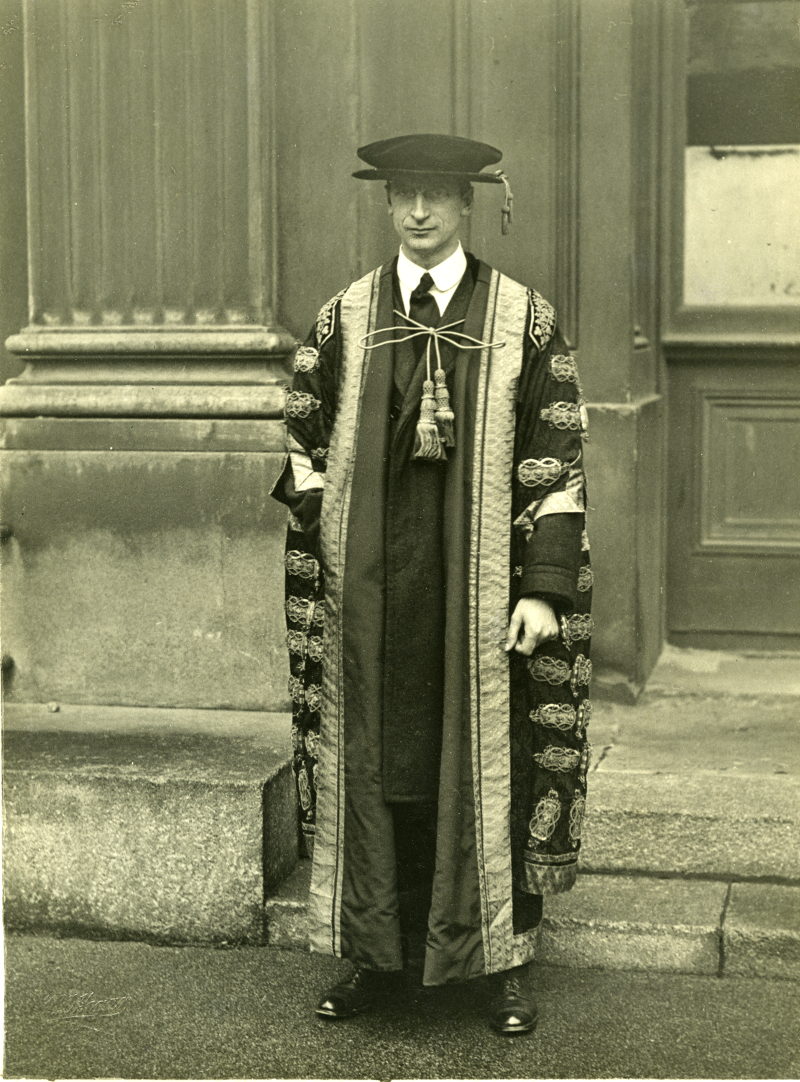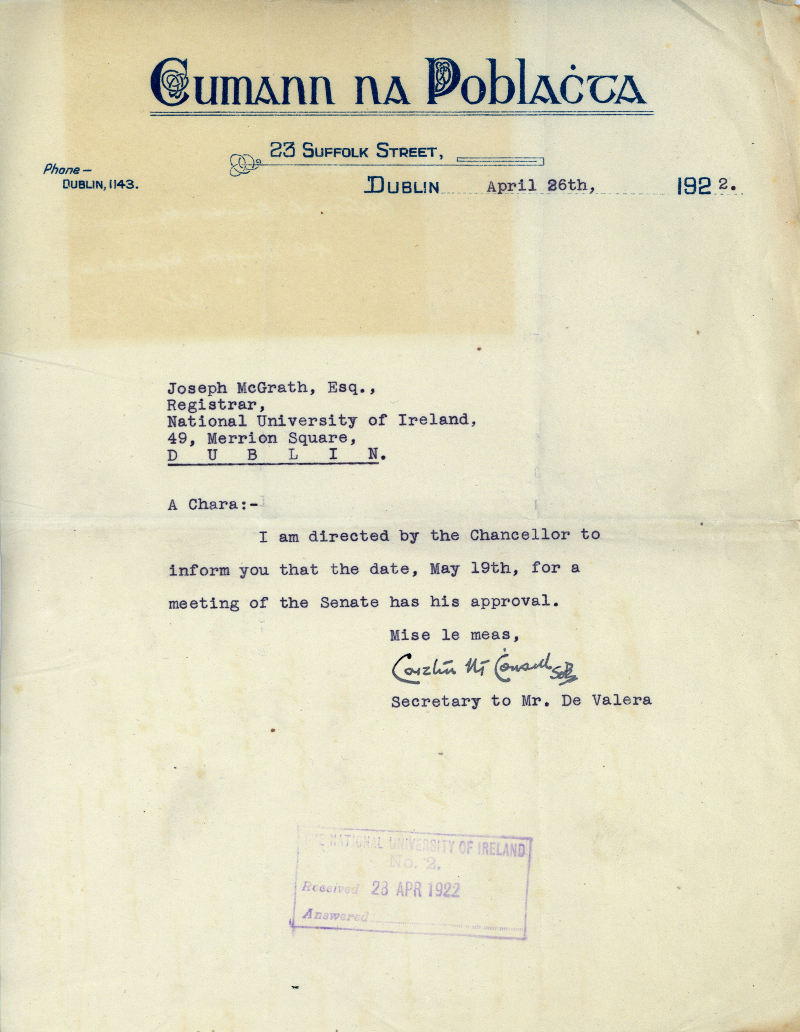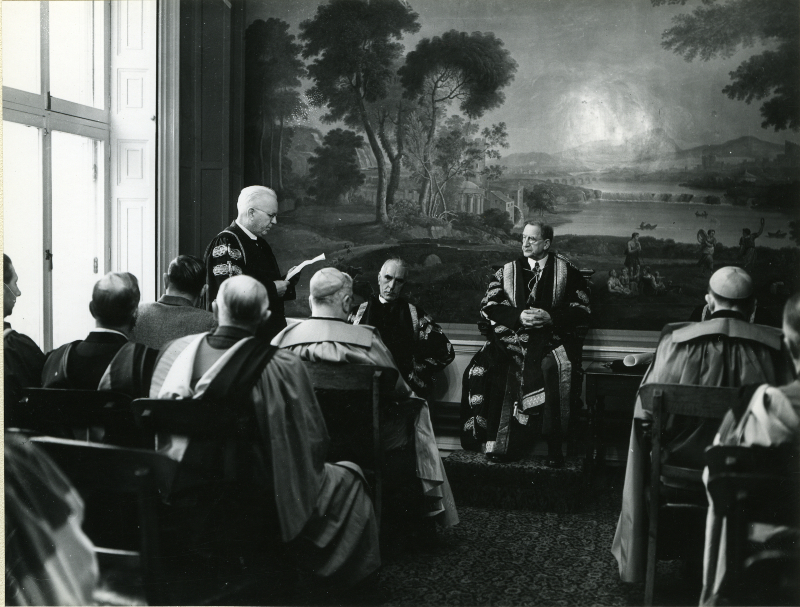20.07.2021
Centenary of de Valéra’s Chancellorship of NUI
On this day one hundred years ago, Éamon de Valéra was elected, unopposed, Chancellor of the National University of Ireland, a role he filled with distinction until his death in 1975. Succeeding Archbishop William Walsh, Éamon de Valéra, was the first Chancellor to hold the office in the new State and was particularly important in the development of the new university and its member institutions. Over time, having the Head of Government and later Head of State as its Chancellor helped to establish the National University of Ireland as a national institution, enhancing the status and standing of the university nationally and internationally.

Éamon de Valéra at a formal reception in Earlsfort Terrace marking his election as Chancellor on 19 November 1921, reproduced by kind permission of UCD-OFM Partnership.
Click to enlarge image
Prior to his election as Chancellor, Éamon de Valéra (1882-1975) held a variety of teaching positions in, among others Belvedere, Carysfort Training College, St Mary’s College, Rathmines and St Patrick’s College, Maynooth. In the summer of 1913, de Valéra unsuccessfully applied for a chair in mathematics at University College Cork. This failure inadvertently and somewhat ironically led to de Valéra occupying the highest office in the whole university (McCartney 1983, 25). Shortly after his rejection by UCC, de Valéra joined the Irish Volunteers and subsequently took leadership roles in the War of Independence and the first Dáil Éireann (1919).
Just before his election as Chancellor, he was involved in the Truce of July 1921 and just after, he received approval from Dáil Éireann to upgrade his role from Chairman of the Cabinet to President of the Republic, absenting himself from the treaty negotiations (October-December 1921) during which an agreement involving the partition of Ireland was reached. De Valéra resigned in protest and shortly afterwards, civil war erupted. As nominal leader of the Anti-Treatyites, engaging in public life was difficult; he was in hiding or in prison during the early years of his chancellorship of NUI. After 1924, however, de Valéra was in regular attendance, rarely missing a meeting of Senate for the next fifty-one years.
The nomination of Éamon de Valéra was not based on his (limited) academic achievements and experience, though he was highly regarded by his mentors and peers, as Professor Donal McCartney (1983, 28) notes:

Letter approving date of Senate meeting.
Click to enlarge image
It should be a matter of encouragement to all struggling students that a part-time student of the old Royal University, with a pass degree, a pass diploma, a defunct master’s and a rejection for a professorship in UCC had now become the chief officer of the University.
Rather, it was his significant role in the political life of the nation that had nationalist members of the Senate of the University seek his approval for nomination. “In a very real sense he now embodied the political, military, cultural and academic dimensions of the Irish nation” (Farragher 1984, 132). The inauguration of ‘Dev’ marked the official beginning of a life-long association between one of the most dominant statesman of the new Irish state and the National University. De Valéra’s chancellorship covered his time as President of Dáil Éireann, President of the Irish Republic, leader of the opposition, Taoiseach and President of Ireland.
Only a man with deep commitment to the National University, and to the world of learning generally, would have retained the office so willingly and over so long a period, especially in those years when there were the heaviest demands of his time and energies
(McCartney 1983, 35).
De Valéra gave a notably humble address at a formal reception at Earlsfort Terrace (then the location of University College Dublin, a constituent university of NUI) in November 1921:
I am not blind to the wealth of opportunity you have entrusted to me.
I promise to try to prove worthy of that trust
He was surrounded by several members of the republican government including Cathal Brugha, Ernest Blythe, Constance Markievicz and Richard Mulcahy, the IRA Chief of Staff. The guard of honour was comprised of members of the Student Volunteers Corps and the university contingent of Cumann na mBan.
While de Valéra is an enduringly complex figure in Irish history, he was an exemplary Chancellor of the NUI. He was a fitting choice for the role of Chancellor of the institution that Hyde and Pearse had envisioned as an ‘intellectual headquarters for Irish Ireland’. He had always placed a high value on education and the Irish language in addition to his military and political action for independence. On the day of his inauguration, he addressed members of the University and students in Irish. To the students gathered, he said
A nation’s university should not be a machine for casting standard types and stamping them off. Nor should it be merely a venerable seat of learning. A musty old library could be that. These are only what a university may degenerate into if it stands serenely apart in artificial isolation.
A nation’s university to be worthy should throb with the living fires of a nation’s soul, reflecting back upon the nation its own most energising beams and transmitting to all mankind the glow of its warmth and its light.
Whilst never a professor, in this address we see the metaphors of a physicist and the ambitions of an intellectual, pragmatic and patriotic nation-builder.

Éamon de Valéra in the Senate Room at NUI, 49 Merrion Square, reproduced with the kind permission of UCD-OFM Partnership.
Click to enlarge image
Throughout his political career and chancellorship, de Valéra remained committed to higher learning and creating an educated labour force throughout his political career and chancellorship. Having observed NUI Travelling Studentship scholars (in Celtic Studies) returning to Ireland and leaving academia for lack of opportunities and noting the strength of Celtic Studies scholarship elsewhere, de Valéra worked on a bill to establish an institute of advanced studies in Dublin. Against no little opposition, the Institute for Advanced Studies Act 1940 passed and the DIAS was established with a School of Celtic Studies and a School of Theoretical Physics (encompassing the Dunsink Observatory). To an outsider, this might be an unusual combination but the Institute was a manifestation of Dev’s enduring loves: firstly, a general admiration for higher learning; secondly, his particular interest in both physics and the Irish language.
While his work in politics reflected his interest in education, his work in the University remained – as many would attest – politically neutral. He had an equal interest in all the universities and maintained positive relations with senior colleagues in Trinity College Dublin. He did not allow his political activities to colour his work in the NUI nor the reverse: ‘the colleges of the NUI did not benefit greatly in financial terms from de Valera’s pivotal position within Irish politics’ (Walsh 2008, 140). He was careful to remain impartial, whilst exceptionally diligent, through many challenging decades for the University and the state.
"His low-key approach made the Chancellor a unifying figure in a
relatively new and diverse institution, where the different colleges were
seeking to develop their own distinctive identity…de Valera made the
Office of Chancellor a symbol of unity and impartiality for the different
institutions of the National University."
(Walsh 2008, 145)
De Valéra’s experience and development as a political leader mirrored that of the state, and of the University too. Elected President of Ireland in 1959, de Valéra maintained an active interest in the NUI and at the age of 92, exercised his duties as chair of Senate in July 1975, just a month before his death. The Senate minutes record that following his death, the Senate passed a vote of sympathy to the de Valéra family, unanimously:
Ag deireadh a réime urramaí cáiliúla, féachann muid, comhleacaithe Éamon de Valéra, LLD, PhD, DSc, FRS, ar Sheanad Ollscoile na hÉireann, dara Seansailéar na hOllscoile, ar a bhás mar bhris náisiúnta, agus cuireann muid in iúl ár mbuíochas ar shon a sheirbísí iomadúla, seirbhísí a léiríonn forás agus dul chun cinn stairiúil i bhforbairt na hÉireann.
[At the end of his illustrious reign, we, Senate colleagues of Éamon de Valéra, LLD, PhD, DSc, FRS, the second Chancellor of the University, look on his death as a national loss, and express our gratitude for his many services, which reflect historical growth and progress in the development of Ireland.]
The National University of Ireland is very proud of the long association between Éamon de Valéra and the University. We honour this association today, virtually, and hope to have an in-person event to celebrate the centenary of his inauguration as Chancellor in the Autumn.
Tá Ollscoil na hÉireann an-bhródúil as an gcomhlachas fada idir Éamon de Valéra agus an Ollscoil. Tugaimid ómós don chumann seo inniu, go fíorúil, agus tá súil againn imeacht bheo a bheith againn chun comóradh céad bliain a inseolta mar Sheansailéir a cheiliúradh san Fhómhar.
Message form President Michael D. Higgins to NUI on the occasion of the
centenary of Éamon de Valéra’s election as Chancellor of the University
Please click to view the
Message form President Michael D. Higgins to NUI
on the occasion of the centenary of Éamon de Valéra’s
election as Chancellor of the University
References:
Farragher, S.P. 1984. Dev and his Alma Mater: Eamon de Valera’s lifelong association with Blackrock College, 1898-1975. Dublin: Paracelete Press.
McCartney, D. 1983. The National University of Ireland and Eamon de Valera. Dublin: University Press of Ireland.
Walsh, J. 2008. Eamon de Valera, 1921-75. In T. Dunne, J. Coolahan, M. Manning & G. Ó Tuathaigh (eds) The National University of Ireland, 1908-2008: Centenary Essays. Dublin: University College Dublin Press,135-145.
Further information from:
The Registrar
National University of Ireland
49 Merrion Square
Dublin 2, D02 V583
Ph: 01 4392424
www.nui.ie
Twitter: @NUIMerrionSq
Facebook: National University of Ireland
« Previous






















